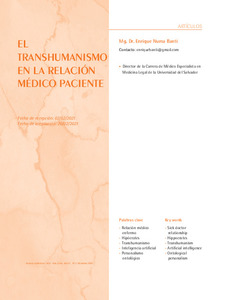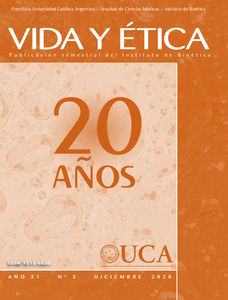Por favor, use este identificador para citar o enlazar este ítem:
https://repositorio.uca.edu.ar/handle/123456789/14931| Campo DC | Valor | Lengua/Idioma |
|---|---|---|
| dc.contributor.author | Numa Banti, Enrique | es |
| dc.date.accessioned | 2022-09-08T14:31:48Z | - |
| dc.date.available | 2022-09-08T14:31:48Z | - |
| dc.date.issued | 2020 | - |
| dc.identifier.citation | Numa Banti, E. El transhumanismo en la relación médico paciente [en línea]. Vida y Ética. 2020, 21 (2). Disponible en: https://repositorio.uca.edu.ar/handle/123456789/14931 | es |
| dc.identifier.issn | 1515-6850 | - |
| dc.identifier.issn | 2683-6998 (online) | - |
| dc.identifier.uri | https://repositorio.uca.edu.ar/handle/123456789/14931 | - |
| dc.description.abstract | Resumen: En el presente trabajo presentamos la visión clásica, es decir la propugnada por Hipócrates, de la relación médico paciente o médico enfermo como la designó Pedro Laín Entralgo, también definimos al movimiento tecno científico y cultural denominado “Transhumanismo” y con él la aparición de la llamada “Inteligencia artificial”. Analizamos este paradigma dentro de la relación médico paciente que comienza a asomar en el ámbito de la medicina especialmente en la denominada “medicina prepaga” con la finalidad de favorecer y disminuir los tiempos tanto para el paciente como para el médico. En ese sentido, la Bioética Personalista Ontológica alza su voz para marcar la desnaturalización que involucra las esencias de las personas involucradas (médico y enfermo) en el diálogo cara a cara de la entrevista médica y señala lo desfavorable del avasallamiento de la tecnología y con ella la Inteligencia artificial por encima de la interrelación fecunda del paciente y su médico en pos de reestablecer la salud del primero. | es |
| dc.description.abstract | Abstract: In this paper we present the classic vision, that is, the one advocated by Hippocrates, of the patient-doctor or sick physician relationship as designated by Pedro Laín Entralgo, we also define the techno-scientific and cultural movement called “Transhumanism” and with it the appearance of called “artificial intelligence”. We analyze this paradigm within the patient medical relationship that begins to appear in the field of medicine, especially in the so-called “prepaid medicine” in order to favor and reduce times for both the patient and the doctor. In that sense, the Ontological Personalist Bioethics raises its voice to mark the denaturation that involves the essences of the people involved (doctor and patient) in the face-toface dialogue of the medical interview and points out the unfavorable of the overwhelming technology and with it Artificial intelligence above the fertile interrelation of the patient and his doctor in order to restore the health of the former. | es |
| dc.format | application/pdf | es |
| dc.language.iso | spa | es |
| dc.publisher | EDUCA | es |
| dc.rights | Acceso abierto | * |
| dc.rights.uri | http://creativecommons.org/licenses/by-nc-sa/4.0/ | * |
| dc.source | Vida y Ética Año 21, N° 2, 2020 | es |
| dc.subject | RELACION MEDICO-PACIENTE | es |
| dc.subject | TRANSHUMANISMO | es |
| dc.subject | INTELIGENCIA ARTIFICIAL | es |
| dc.subject | PERSONALISMO ONTOLÓGICO | es |
| dc.subject | Hipócrates, ca. 460-ca. 370 a. C. | es |
| dc.title | El transhumanismo en la relación médico paciente | es |
| dc.type | Artículo | es |
| uca.disciplina | BIOETICA | es |
| uca.issnrd | 1 | es |
| uca.affiliation | Fil: Numa Banti, Enrique. Universidad del Salvador; Argentina | es |
| uca.version | publishedVersion | es |
| item.languageiso639-1 | es | - |
| item.fulltext | With Fulltext | - |
| item.grantfulltext | open | - |
| Aparece en las colecciones: | VE - 2020 Año 21 nro. 2 | |
Ficheros en este ítem:
| Fichero | Descripción | Tamaño | Formato | |
|---|---|---|---|---|
| transhumanismo-relación-médico.pdf | 229,77 kB | Adobe PDF |  Visualizar/Abrir | |
| vidayetica2020-2-portada.pdf | 54,68 kB | Adobe PDF |  Visualizar/Abrir |
Visualizaciones de página(s)
112
comprobado en 27-abr-2024
Descarga(s)
120
comprobado en 27-abr-2024
Google ScholarTM
Ver en Google Scholar
Este ítem está sujeto a una Licencia Creative Commons

